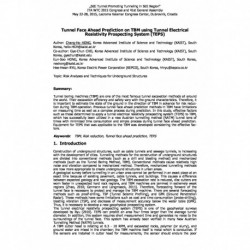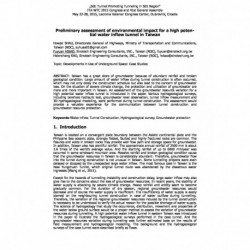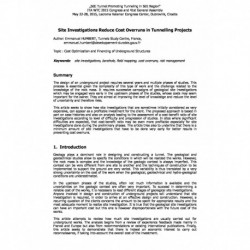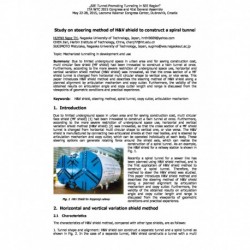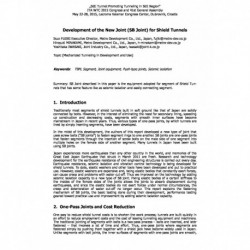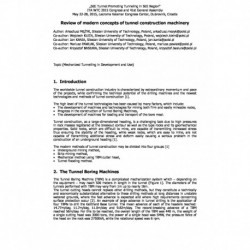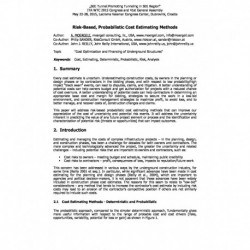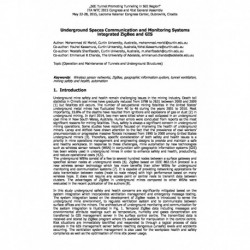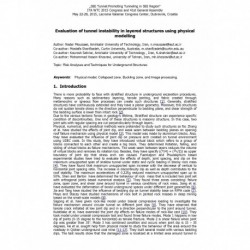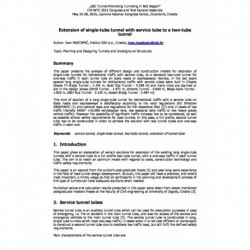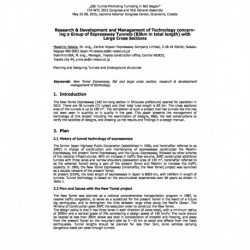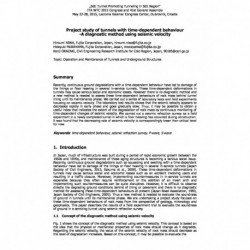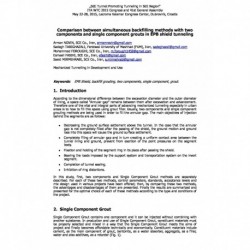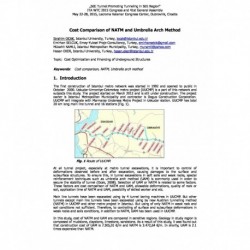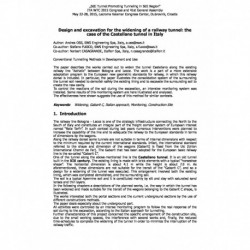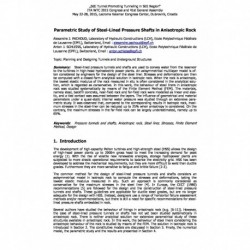No document
Search & filter
Search for a publication
Search & filter
World Tunnelling Congress
WTCThere are 1984 documents.
-
Tunnel Face Ahead Prediction on TBM using Tunnel Electrical Resistivity Prospecting System (TEPS)
Abstract: Construction of underground structures, such as cable tunnels and sewage tunnels, is increasing with the development of cities. Tunnelling methods for the construction of underground structures are divided into conventional methods (such as a drill and blasting method) and mechanized methods (such as the Tunnel Boring Method, TBM). Conventional methods cause relatively high noise and vibration...
0,00 € -
Preliminary assessment of environmental impact for a high potential water inflow tunnel in Taiwan
Abstract: Taiwan is located on a convergent plate boundary between the Asiatic continental plate and the Philippine Sea oceanic plate, strongly folded, faulted and highly fractured rocks are common. The fissures and voids in broken rocks may provide well flow path and storage space for groundwater. In addition, Taiwan also has plentiful rainfall. The approximate annual rainfall of 2500 mm is about 2.6...
0,00 € -
Site Investigations Reduce Cost Overruns in Tunnelling Projects
Abstract: Geology plays a dominant role in designing and constructing a tunnel. The geological and geotechnical studies allow to specify the conditions in which will be realized the works. However, the rock mass is complex and the knowledge of the geologic context is always imperfect. This context can be very different from one site to another and the techniques of construction to be implemented to...
0,00 € -
Study on steering method of H and V shield to construct a spiral tunnel
Abstract: Due to limited underground space in urban area and for saving construction cost, multi circular face shield (MF shield) [1] had been innovated to construct a twin tunnel at once. Furthermore, according to the more severe restriction of underground space use, horizontal and vertical variation shield method (H&V shield) [2] was innovated, so that the cross section of a MF shield tunnel is...
0,00 € -
Development of the New Joint (SB Joint) for Shield Tunnels
Abstract: Traditionally most segments of shield tunnels built in soft ground like that of Japan are solidly connected by bolts. However, in the interest of eliminating the need for secondary lining, speeding up construction and decreasing costs, segments with smooth inner surfaces have become mainstream in Japan in recent years. Thus, various types of one-pass joints, by which tunnels are lined by simply...
0,00 € -
Review of modern concepts of tunnel construction machinery
Abstract: The worldwide tunnel construction industry is characterized by extraordinary momentum and pace of the projects, while confirming the technical potential of the drilling machines and the newest technologies and methods of tunnel construction [1]. The high level of the tunnel technologies has been caused by many factors, which include: • The development of machines and technologies for mining...
0,00 € -
Risk-Based, Probabilistic Cost Estimating Methods
Abstract: Every cost estimate is uncertain. Underestimating construction costs, by owners in the planning or design phases or by contractors in the bidding phase, and with respect to low probability/high impact “black swan” events, can lead to disputes, claims, and litigation. A better understanding of potential costs can help owners budget and get authorization for projects with a reduced chance of cost...
0,00 € -
Underground Spaces Communication and Monitoring Systems integrated ZigBee and GIS
Abstract: Underground mine safety and health remain challenging issues in the mining industry. Death toll statistics in China’s coal mines have gradually reduced from 5798 to 2631 between 2000 and 2009 [1] but fatalities still occurs. The number of occupational mining fatalities in the United States’ underground metal mines has fluctuated from 40 to 46 during the years 2001 to 2010. Most importantly,...
0,00 € -
Evaluation of tunnel instability in layered structures using physical modelling
Abstract: There is more probability to face with stratified structure in underground excavation procedures. Many reasons such as sedimentary layering, tensile jointing, and fabric created through metamorphic or igneous flow processes can create such structures []. Generally, stratified structures have continuously extended and they have a planar geometry. Moreover, this structures do not sustain tensile...
0,00 € -
Extension of single-tube tunnel with service tube to a two-tube tunnel
Abstract: This paper presents the analysis of different design and construction models for extension of single-tube tunnels for bidirectional traffic with service tube, to a standard two-tube tunnel for one-way traffic in each tunnel tube on state roads or expressways. Namely, in the last years several long single-tube tunnels for bidirectional traffic with service tubes were built in Croatia (Sveta Tri...
0,00 € -
Research and Development and Management of Technology concerning a Group of Expressway Tunnels (83km in total length)...
Abstract: The New Tomei Expressway (162 km-long section in Shizuoka prefecture) opened for operation in 2012. There are 36 tunnels (71 tubes) and their total tube length is 83 km. The cross sectional area of the tunnels is up to 190 m. The completion of such a project that has tunnels like this has not been seen in quantity or in quality in the past. This paper presents the management of technology of...
0,00 € -
Project study of tunnels with time-dependent behaviour -A diagnostic method using seismic velocity
Abstract: Recently, continuous ground degradations with a time-dependent behaviour have led to damage of the linings or floor heaving in several in-service tunnels. These time-dependent deformations in tunnels may cause serious social and economic losses. However there is no diagnostic method and a new method is needed to assess these time-dependent behaviours of rock mass behind tunnel lining until its...
0,00 € -
Comparison between simultaneous backfilling methods with two components and single component grouts in EPB shield...
Abstract: According to the dimensional difference between the excavation diameter and the outer diameter of lining, a space called “Annular gap” remains between them after excavation and advancement. Therefore one of the vital and integral parts of advancing mechanized tunneling especially in urban areas is to how to fill this space using grout filler. Usually, two components and single component...
0,00 € -
Cost Comparison of NATM and Umbrella Arch Method
Abstract: The first construction of Istanbul metro network was started in 1992 and opened to public in October 2000. Uskudar-Umraniye-Cekmekoy metro project (UUCMP) is a part of this network and subjects this study. The project started on March 2012 and is still under construction. The project owner is Istanbul Metropolitan Municipality and contractor is Dogus Construction Corporation. UUCMP will...
0,00 € -
Design and excavation for the widening of a railway tunnel: the case of the Castellano tunnel in Italy
Abstract: The railway line Bologna – Lecce is one of the strategic infrastructure connecting the North to the South of Italy and constitutes an integral part of the freight corridor system of European interest named “Rete Terfn”. In such context during last years numerous interventions were planned to increase the capability of the line and to adequate the railway to the European standards in terms of...
0,00 € -
Parametric Study of Steel-Lined Pressure Shafts in Anisotropic Rock
Abstract: The development of high-capacity Pelton turbines and high-strength steel (HSS) allows the design of high-head power plants up to 2000m gross head to meet the increasing demand for peak energy [1]. With the rise of volatile new renewable energies, storage hydropower plants are subjected to more drastic operational requirements to balance the electricity grid. HSS has been developed to address...
0,00 €

